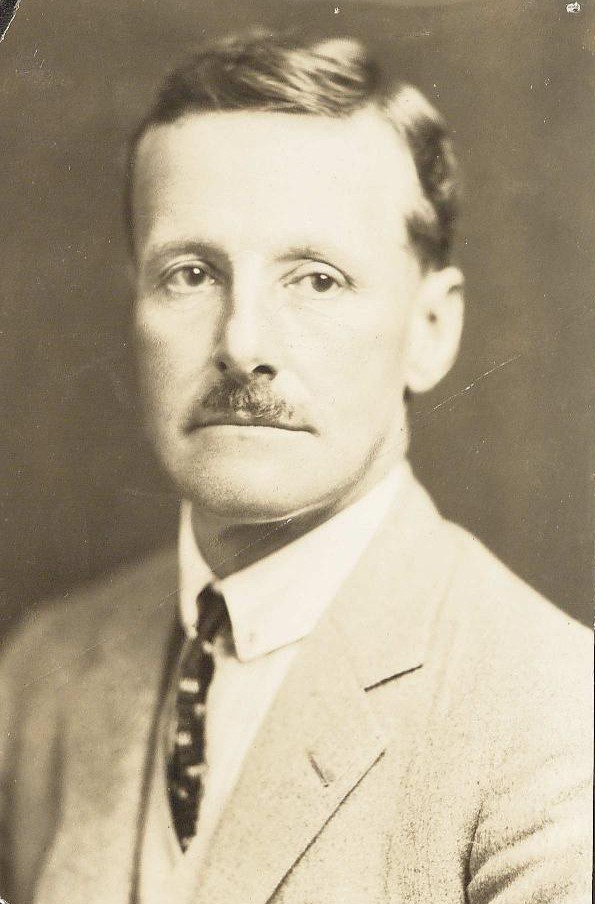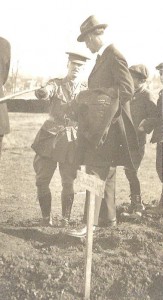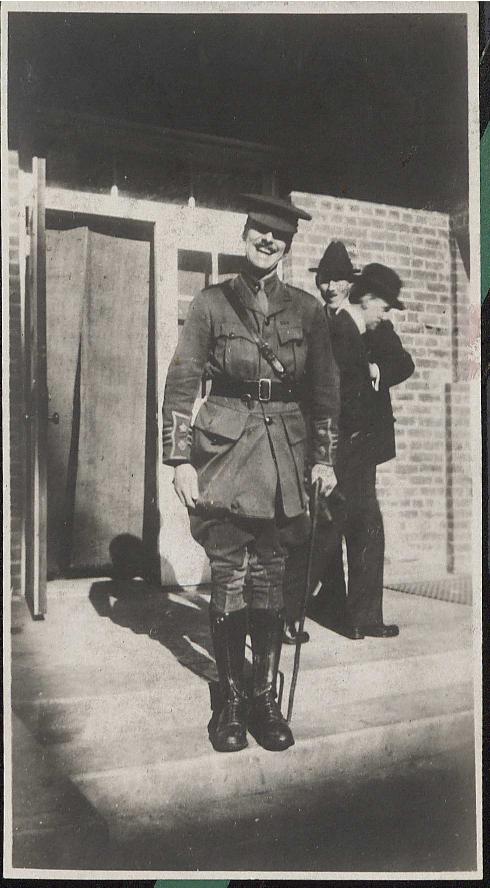Colonel John Leader, The Man Who Prepared Oregon for World War I
 An interesting question about a seminal figure on the University of Oregon campus in the early 20th century came in last week. We received an email from a researcher in Patrickswell Town, County Limerick, Ireland that sought more information about Colonel John Leader, the man who formed the ROTC program on the University of Oregon campus and played an integral role in preparing Oregon for World War I. Below is a paraphrased summary of the request:
An interesting question about a seminal figure on the University of Oregon campus in the early 20th century came in last week. We received an email from a researcher in Patrickswell Town, County Limerick, Ireland that sought more information about Colonel John Leader, the man who formed the ROTC program on the University of Oregon campus and played an integral role in preparing Oregon for World War I. Below is a paraphrased summary of the request:
We have a building which we have been advised belongs to the family of Lieutenant-Colonel John Leader 16th (Service – Pioneer) Battalion. We are trying to protect this building for future generations and have it claimed as a listed building before some friendly local developer decides to tear it down and build some modern apartment block or something worse!! We’re hoping to use this building as the local community hall that would serve the good of the local village, young and old alike, but I’m not very good at searching the net I’m afraid.
If you could provide some background or pictures on Lieutenant-Colonel John Leader, that would be just amazing and all I can offer is a heartfelt thank you and possibly an invite to the opening of the centre once we secure the building as a listed building and have it restored to its natural beauty. I cannot offer much more by way of begging… Our little village is tiny in size — 3 pubs, 3 food stores and petrol stations, 2 hair dressers, 1 chemist, 1 school, 1 local GAA hall, and a very much needed building that reminds us all where we came from.
This inquiry led us to investigate deeper in the stacks. What we learned was the story of a remarkable man who lived a remarkable life.
John Leader was born in Quetta, a high-altitude city in modern-day Pakistan, to Irish parents in 1877. He was born into a long line of military men; his father, also named John Leader, was a colonel who enjoyed a distinguished career in the British military service. As a youth, the family returned to the ancestral home in Keal, County Cork, where Leader was educated at Wellington College.
He then entered the Royal Military Academy at Sandhurst, becoming the thirteenth in a line of Leaders to serve in the British military. While at Sandhurst he was a cadet in the Bedfordshire regiment. His first official military assignment took Leader to Germany, where the polylingual Irishman served as an official interpreter. In 1899 he saw his first action in the field in 1899, when he was sent to South Africa as part of the influx of colonial troops fighting in the Anglo-Boer War. From South Africa he was sent as part of an expeditionary party sent into China to quell the Boxer Rebellion. Colonel Leader distinguished himself in the field in India, Arabia, and Siberia, and was designated as a military observer for British government in Japan during Russian-Japanese War.
Colonel Leader retired from active military service and relocated to Vancouver, British Columbia with his English wife, Evelyn Pleydell-Bouverie, in 1909. Evelyn was the daughter of Colonel John Pleydell-Bouverie, former commander of the 17th Royal Lances, and the niece of the Earl of Radnor. In Canada, the colonel started an export/import business that flourished. The Leaders also started a family; their first two sons, Johnny and Michael, were born during their first period of residence in Canada.
 Then World War I erupted in Europe, and Colonel Leader immediately returned to England. From there he recruited troops in Ireland before taking command of the 16th Royal Irish Rifles within General French’s Ulster division in October 1914. He served two years on the front, one of the few veteran British officers to survive the period of intense warfare. Leader would finally be forced to leave the front in 1916 after being severely wounded at the Battle of the Somme when his position at Aveluy Wood was hit by 13 German shells. Though he wasn’t directly hit by the blasts, the shells collapsed the dugout, and Leader was crushed under the walls. After recovering, Colonel Leader was placed in charge of an officers’ training camp when he received a message from the president of the University of Oregon, Prince Lucien Campbell. Given permission to leave the military once again, Colonel Leader arrived in Eugene with his family on December 30, 1917.
Then World War I erupted in Europe, and Colonel Leader immediately returned to England. From there he recruited troops in Ireland before taking command of the 16th Royal Irish Rifles within General French’s Ulster division in October 1914. He served two years on the front, one of the few veteran British officers to survive the period of intense warfare. Leader would finally be forced to leave the front in 1916 after being severely wounded at the Battle of the Somme when his position at Aveluy Wood was hit by 13 German shells. Though he wasn’t directly hit by the blasts, the shells collapsed the dugout, and Leader was crushed under the walls. After recovering, Colonel Leader was placed in charge of an officers’ training camp when he received a message from the president of the University of Oregon, Prince Lucien Campbell. Given permission to leave the military once again, Colonel Leader arrived in Eugene with his family on December 30, 1917.
At the University of Oregon, Colonel Leader was hired to serve as a military instructor on campus. He worked to help train a university battalion for the war effort, arranging classes and causing trenches to be dug across the campus for training purposes. Both students and faculty were trained, staging exercises in the surrounding wilderness and learning to build bridges across the Millrace. Leader was instrumental in helping form the Reserve Officers Training Corps (ROTC) program at the university in 1918. Leader was the second-highest ranking British officer to reside in the United States during World War I, giving speeches throughout Oregon and preparing coastal communities for potential attacks from the Pacific. After the war, Colonel leader was also named an honorary full colonel of the Oregon National Guard for his service to the state.
While in Oregon, his wife gave birth to their third son, Deryck. Though only in Oregon for a short period, the entire family would come to regard Oregon as a second home. Leader retired from the university in 1919 to relocate back to Vancouver, but returned to Oregon from his home in British Columbia for regular visits to the state. His later years in Canada were marked by a return to the import/export business, and he served for a period as the president of American Pacific Export Company. In 1922 he produced a memoir about his time at the University of Oregon, Oregon Through Alien Eyes. After nearly a half-century of civilian life, Colonel Leader passed away at age 90 on March 8, 1967 at his home in Vancouver.
See these sources in the Special Collections and University Archives for further information about the life of Colonel John Leader:
- Col. John Leader, University Archives biographical files, UA Ref 2, box 7, Special Collections & University Archives, University of Oregon Libraries, Eugene, Oregon.
- All images used in this post were collected from: Colonel John Leader, University Archives photographs, UA Ref 3, box 14b, Special Collections & University Archives, University of Oregon Libraries, Eugene, Oregon.
- John Leader, Oregon Through Alien Eyes (Portland: Meier and Frank, 1922). F881.L43 1922b.
Zach Bigalke
Student Research Assistant



